#Case Study Analysis
Text
Case Study: Unveiling the Features That Influence Air Conditioner Purchases
Explore our comprehensive case study delving into the key features that drive consumer decisions when purchasing air conditioners. Discover what makes a difference in this cooling industry analysis.
#Air Conditioner Purchase Factors#Features Influencing AC Buyers#Case Study Analysis#Consumer Preferences in Cooling#HVAC Purchase Decision#Air Conditioning Features Study#Cooling Appliance Choices#Energy-Efficient AC Options#Cooling Technology Trends#Consumer Buying Behavior#AC Features Impact#Study on Air Conditioner Selection#Climate Control Preferences#Home Cooling Solutions#AC Purchase Patterns#Influential Features in HVAC#Energy Efficiency in Cooling#Consumer Insights on ACs#Cooling Appliance Selection#Air Conditioner Buying Case Study
0 notes
Text
I think one of the reasons I'm absolutely insane about Jun Mochizuki's work is because she's the only person I've seen do a perfect execution of the "abused becomes the abuser" trope.
All of the characters in Pandora Heart and Vanitas no Carte are incredibly morally complex. They're heart wrenching, relatable, endearing, aggravating, and endlessly flawed.
MochiJun puts us in the uncomfortable position of confronting that victims can be perpetrators, that those who are hurt can hurt others, that sometimes, people you love are bad, and sometimes you love bad people.
Abuse is never justified; it's handled by different characters in a variety of ways. It's repressed, reciprocated, passed on, and stopped. MochiJun shows victims become awful people, not inherently because they were abused, but because of who they are as people and how that shapes the way they deal with abuse.
She shows victims as the complex people they are beyond victimhood. There are characters who are just and kind after facing abuse, and ones who are twisted and cruel. Most delightfully, she brings us characters who are both.
The heroes of her stories choose love, gentleness, compassion, and mercy. She shows that our choices matter, that our relationships are integral to who we are.
I think of how some of the characters, in spite of these forgiving traits, are not required to forgive their abusers in order to be seen as virtuous figures. They're allowed to stand their ground, even if it's violent to do so.
I think of how, at the same time, some characters are loved despite being abusive, because a tender character sees more in them than evil. Because abuse comes from people, and people are endlessly complex.
I think of how the heroes of the story tear themselves apart for the violence they inflict, and are shown the most painful love in return. How that love often comes in the form of calling them out on their bullshit.
I love the love in Pandora Hearts and in Vanitas no Carte because it's painfully human in the face of horrors beyond mortal comprehension.
I love the flaws in the characters because they're painfully human despite some of these characters' otherworldly natures.
Jun Mochizuki doesn't show us the abused becoming abusers to give us the idea that abuse is an unstoppable cycle, but rather to show that it is stoppable. To show that people have a choice in who they become. And that's one of the most wonderful and terrible things about people.
#alkafdjklfjklfdjfk i'm so normal about mochijun's work i promise#pandora hearts#vanitas no carte#vnc#the case study of vanitas#jun mochizuki#meta#analysis
318 notes
·
View notes
Text
The recent chapter has reinforced what I’ve been screaming about Noé from day one. If you will not take anything else from Noé Archiviste, take this. To analyze him you are required to understand that Noé is disconnected from everything.
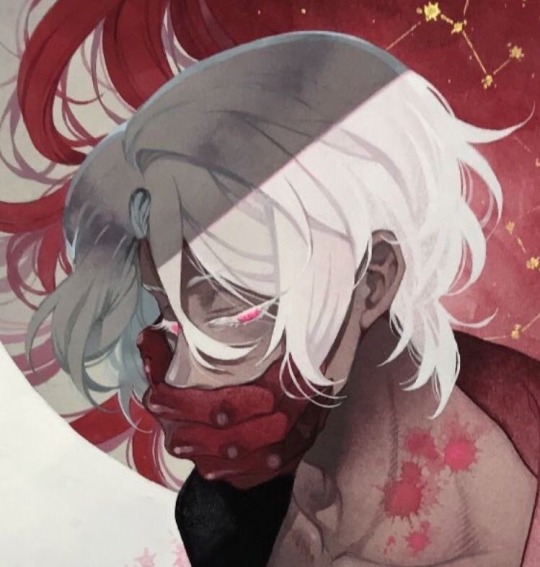
He is disconnected from himself, his past, the world, and reality. And this isn’t simply from being sheltered (though that plays a significant role). Because of this, he offers an honest, open and “pure” view of a situation. Even without going into the psychological rabbit hole mochijun executed in Pandora Hearts, you can see Noe’s lines/scenes are chosen with calculation and are very layered. A minor example, him getting lost all the time. It makes for a funny gag but it feeds into the point I’m making here. Conceptually, Noé is a floating balloon, hovering over the world. He can give you the best perspective because he’s not on the ground. That is why Noé sees himself as too strong or untouchable. Because he believes he is in a different world from anyone else. And I think this is something many people can relate to. But then it becomes complicated when Noé chooses to be unaware. Noé knows treating Dante and his companions like shit is wrong. But the gears turned in his head, people that he likes are doing something harmful. And he picks the option that won’t make him dwell on it: it’s an accident. Oh perhaps they didn’t know their names.
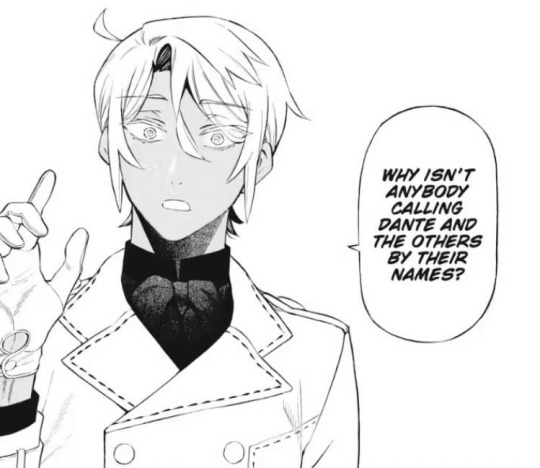
Noé depends on toxic optimism. From this we’ve seen it, several times throughout the story, turn into utter delusion. This is why some ppl, including myself, get Jack vibes from him. If you know you know, that man invented the word delusional. In order to keep himself together, to distract himself from his own self-loathing and loneliness, he has clung onto this thinking like a lifeline. Noe and Vanitas are very similar but chose different ways of coping which is a reason he is able to reach him. It’s easier to focus and believe in the beauty of everything else than looking at your own reflection. It’s easier to proclaim that the world is beautiful than to say that it wronged you and you feel so different and so you hate yourself.
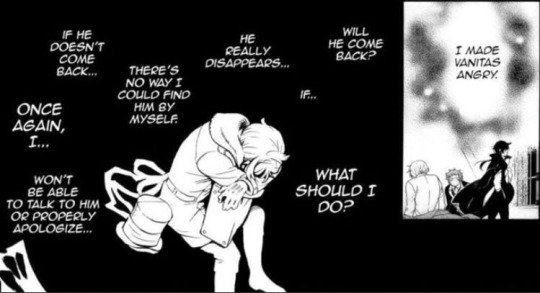
Which is why I believe Noé will be the final antagonist, anti-hero whatever the fuck. Not bc it’ll be a cool twist, the writing is on the wall. This is the logical destination of his character. Will he be saved at the end? Probably but who fucking knows mochijun. Noé is going be confronted with so many harsh truths and Vanitas dying is the biggest one. It is set in stone, an event that is fated to happen no matter what Noé does. Whether he’s time-looping this shit or living on alone. Vanitas’ death is the biggest reality Noé cannot escape from. And thus, that will break him. He will try to remain in his dreams, memories, and delusions. But eventually....you’re going to wake up.
#anime#manga#the case study of vanitas#les memoires de vanitas#vanitas no carte#jun mochizuki#vnc#vnc manga#noe archiviste#noé#character analysis#breakdown#such an amazing character#I’ll always love him
472 notes
·
View notes
Text
i could point out the beautiful parallels between nico's crush on percy, the crush he developed due to childhood trauma and intense hero worship and hung onto even after he thought his hero betrayed him, and annabeth's crush on luke, the crush she developed due to childhood trauma and hero worship and held onto even after her hero betrayed her, and how both of their crushes are commentary on their upbringings, nico's being how grief and internalized homophobia caused him to latch onto the beautiful hero that saved his life, annabeth's being how growing up neglected and unwanted caused her to latch onto the first person who showed her any attention and how that attachment only strengthened in their shared grief, and how those parallels extended to show how their respective attachments left them vulnerable to manipulation yet ended up not joining the dark side, ironically in part because of percy, either because of the crush (nico) or in spite of the crush (annabeth), and how those crushes contributed to their overall character arcs, nico's being to learn to let go: of grudges, grief, and his own self-hatred as a two part climax on that one page of boo and the cocoa puffs in tsats with will being the catalyst to making him see his own worth, annabeth's being to learn what real, healthy love looks like (a spot of irony: percy taught her this, which is contrasted with her typically being the person to teach him stuff) in contrast to what she ultimately got with luke which was manipulation, because luke, also being a neglected kid, never learned what healthy love looks like, but you guys are not ready to hear that so instead i'll just try not to cry at the hypocrisy of the pjo fandom's obsession with nico's crush on percy while refusing to see annabeth's crush on luke as anything more than a disgusting mistake
#i know a lot of it is because of the age difference but the age difference is part of the theme in annabeth's case#y'all got half way there. you know it's gross. please please try and take it a step further and think about why rick would add it anyway#rick riordan#percy jackon and the olympians#pjo fandom#pjo hoo toa#percy jackson#percabeth#solangelo#annabeth chase#nico di angelo#luke castellan#rrverse#pjoverse#pjo meta#percy jackson analysis#pjo analysis#meta#analysis#annabeth chase character study#nico di angelo character study#character study#character analysis#tw neglect#tw internalized homophobia#pjo#percy jackson meta
296 notes
·
View notes
Text
Interesting tidbit from this Wikipedia article in light of today's episode (emphasis mine) :
Much of Newton's writing on alchemy may have been lost in a fire in his laboratory, so the true extent of his work in this area may have been larger than is currently known. Newton also suffered a nervous breakdown during his period of alchemical work.
Newton's writings suggest that one of the main goals of his alchemy may have been the discovery of the philosopher's stone (a material believed to turn base metals into gold), and perhaps to a lesser extent, the discovery of the highly coveted Elixir of Life. Newton reportedly believed that a Diana's Tree, an alchemical demonstration producing a dendritic "growth" of silver from solution, was evidence that metals "possessed a sort of life."
#apparently apocryphal accounts say his dog started the fire and he lost 20 years of research#also apparently he did a lot of like. biblical studies of the apocalypse. so im less surprised they chose to have a case about him now#also also. the great fire of london was 1666.#did the fucking royal society of astronomers burn it down to stop the bubonic plague that was apparently supernatural here?#not astronomers sorry. my minds still on halley#the magnus protocol#tmagp spoilers#my magnus protocol stuff#original post#19 hard reset#queue cause i'll be at work when the episode airs#magnus protocol speculation/analysis
118 notes
·
View notes
Text
MileApo and the rise of Thai soft power
Mile and Apo talking about the Thai period film at the Vogue Thailand Gala on 2022/9/21
I've been meaning to sit down and write about this for a while now, ever since I saw the pattern of Mile and Apo injecting it into their talking points about the 2023 historical film, but it's taken some an effort to actually lay it out. Hopefully the time I sat with it will make the it a more insightful, rich reading experience.
Disclaimers:
(1) I have no formal experience in international relations aside from reading and watching the news, but my strong point is research. Folks with a more formal backgrounds in policsci or IR are welcome to add their input!
(2) Comments about policies or political actions of nations, whether positive, neutral or negative, are not meant to reflect on private individuals of the nationality, even those with a notable amount of social-cultural capital. Private individuals, despite their positions of social influence, most often have little to no individual influence on a policy level**.
So without further ado:
What is soft power? (aka soft power for dummies)
Joseph Nye, a then-Harvard professor, coined the term soft power in the 1980s/early 90s. He described it as:
“A country’s ability to influence the preferences and behaviors of various actors in the international arena (states, corporations, communities, publics etc.) through attraction or persuasion rather than coercion.”
In his book Bound to Lead, Nye established that three prongs of a country's soft power were its culture, its political values, and its policies. Here are two different graphics that further break down what those look like when evaluating soft power in practice.
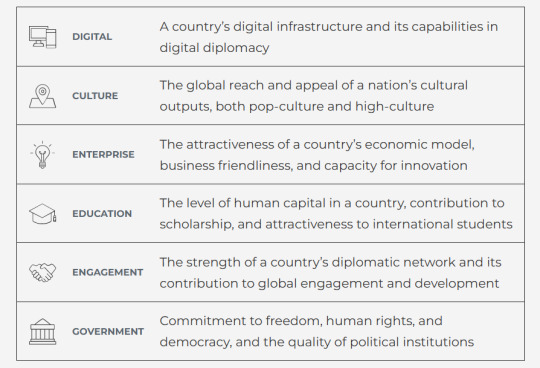
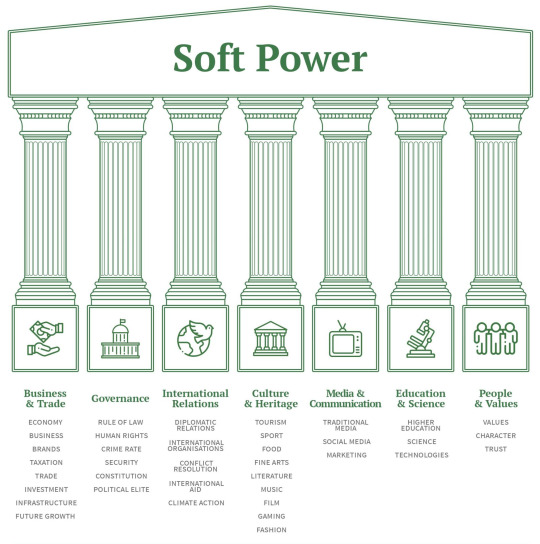
If you feel like all the above is still vague to the point of unparsable in an applied context, I spent the majority of the time researching how to demystify the term especially in the way MileApo discuss it, and found this great explainer:
A strong nation brand and positive soft power perceptions allow a nation to promote itself as a place for people to visit, invest in, and build a reputation for their quality of goods and services. [...] it is often overlooked that a strong nation brand and soft power can deliver better outcomes at home. Primarily it encourages domestic tourism, the consumption of domestic goods and services (rather than imports). Less tangibly it also just makes people feel better about their country.

Expressed in this context, soft power can be understood as the act of building trust in the cultural products of a nation domestically -- some more abstract in the form of art (music, film) and culture, some more concrete like products including fashion and beauty -- in a manner to appeal to its own citizens while also broadening the appeal of cultural goods abroad in a which can drive international tourism, trade, and commerce.
In other words: yes, our collective desire to actually taste Farmhouse bread.
The Thai government and the push for soft power
While my interest in this topic was originally piqued by MileApo's comments, soft power policy has to originate at the government level. Note again that Nye's definition of soft power is centered around "a country’s ability to influence", therefore soft power policy must always formally be expressed nationally.
Around the time MileApo consistently began promoting soft power in alignment with the period film, I noticed a slew of references in Bangkok Post, one of the reputable English online publications based in Thailand.
Back tracking through some of the articles as a reflection of national conversation, since 2020, there has been a consistent theme in terms of what the government is attempting and how well it's going (or not going):
On Thailand's soft power and positioning in the world, Feb 2020:
According to Kitti Prasirtsuk of Thammasat University, who has carried out extensive research into Thailand's branding and repositioning in the age of interconnectedness and social media, Thailand and its culture, values and foreign policy have charisma and high persuasive power which can attract admiration and cooperation. But the Thai people and bureaucrats must change their mindset and perceptions and appreciate their country in real terms first before they take up new challenges.
Within Asean, Thailand is behind Singapore as No.1 [among SE Asian soft power rankings]. The report stated that Thailand has the potential to rise into the top 30 in the world, if the country can strike the right political balance between the rural poor and urban elite. It went on to say that Thailand's weaknesses are problems related to corruption and inequality. It also said that the Thai government is failing to showcase the full potential of Thailand's rich cultural offerings beyond tourism. One more weak link is its poor performance in public diplomacy and digital infrastructure.
(Mile, Apo, and Bible all attended Thammasat University, which is considered one of the premiere universities in Thailand. Apo later transferred and graduated from a different university.)
On Milli, a Thai rapper who performed at Coachella in Spring 2022:
The presence of the 19-year-old rapper Milli at the Coachella Music Festival in the United States has reinvigorated Thailand's soft power ambitions -- an area the Thai government has not fully explored nor exploited. Milli, whose real name is Danupha Khanatheerakul, is the first solo Thai artist to perform at Coachella, a music festival that draws tens of thousands of fans annually.
[Milli's prescence at Coachella] was able to advance Thailand's soft power [in ways previously stalled]. It is not that the government is clueless about "soft power". For decades, governments have focused on presenting Thailand's soft power to the world. However, that iteration of "soft power" mainly consisted of Thai customs and traditions such as food, costume, classical dance, Buddhism rituals and the wai. These aspects of our cultural heritage, despite being charming to foreign tourists, are not sufficient to catapult Thailand's into a stronger position in the global market. Thai cultural heritage has failed to catch up in the digital age…
Milli's song also includes ideas relevant to international audiences. One of her songs openly discusses sexual consent. Being relevant is one of the keys to increasing the nation's presence among diverse populations. The cultural impact made by a young girl like Milli should make the government rethink its cultural promotion strategy. More support is needed for progressive Thai artists and innovators.
An opinion rebuttable on Milli's performance and the government's blundering of reaching for soft power while not meeting basic domestic requirements:
One of the minister's advisers belted out a long speech that did not seem to address how Thailand will become a "soft power" but used the term multiple times. One can't help but wonder if the ministry knows what it is doing, or what the so-called "soft power" it is espousing is about.
Milli's self-taunting line "I don't ride an elephant" may sound a bit old but her rapping about how "the country is good, people are good, our food is good but the government is bood," seems to have struck a chord. "Bood" means rotten in Thai. It is thus understandable if the government was not too coherent when discussing anything about the phenomenon that Milli created. Indeed, [Thailand's Prime Minister] Gen Prayut should feel awkward discussing the "soft power" of Milli and mango sticky rice when he filed a defamation charge against the teen rapper himself back in June last year.
Talented as Milli is, and extraordinary her achievements both locally and at one of the world's most famous music festivals have been, the teenage rapper really has nothing to do with so-called "soft power" which government figures are talking about. Her success is largely individual. Milli created a sensation and a craze. For Thailand's "soft power" to be built, let alone recognised globally, it takes more than one successful artist…
The whole product must be good if it is to exert influence. As experts argued, it takes a wide range of qualities for a country to say it has "soft power". These include the quality of its political institutions, education, digital development, innovation, cultural appeal, strength in arts or business brands. That is why it is odd for everyone to talk about Thailand's "soft power" now when we don't seem to have ticked any of the basic requirements.
On Bangkok International Fashion Week (BIFW):
BIFW2022 has been [a] major and continuing mission to promote and drive Thai fashion to international levels. The event strategically aligns with the government’s strategy to empower Thai fashion industry as fashion is one of the most influential soft power that stimulate economic growth.
Note that multiple actors in BOC walked BIFW2022 in September, as well as multiple actors from other Thai BL shows that aired in 2022.
On the increasing popularity of Thai BL:
Thai BL is now popular across Southeast and East Asia[, and] has been gaining traction in Japan, the home of BL, since 2020. Posters of famous khu jin were put up in a train station. Magazines that cover Thai drama, including BL, are rolled out for the Japanese audience. The Tourism Authority of Thailand has launched a Twitter account that uses BL to engage Japanese consumers. They are conducting research on these issues in the context of soft power.
Yes you read that correctly. No joke, BL as a facet of Thai soft power is so prevalent now that the government is literally tracking its popularity and Twitter conversation around the topic.
So what does this all mean?
Thailand is a country within Asia and internationally that has a lot of appeal as a tourism destination. However, with many competitor alternatives in both entertainment (particularly film and music) and beauty/fashion, which are major drivers soft power within Asia and internationally, and domestic dissidence of policy and politicians due to social conditions, Thai cultural power is not as prominent as it could be and also suffers at the international level.
While there is appeal of specific Thai cultural products internationally (such as Milli at Coachella or in the case of Kinnporsche the Series) the government has failed to activate these prominent media products as part of a cohesive soft power strategy.
However, the government does seem aware of the potential, specifically in the realm of BL. Thailand has always maintained an image of being LGBTQ-friendly among all the Asian countries, and may now be looking to push LGBTQ-aligned media (BL and GL dramas) specifically as part of its soft power strategy to increase pop culture and media appeal.
MileApo on Soft Power
Part of the reason my ears perked up at MileApo's consistent talking point of soft power is again, because even without a polisci background, I'm aware that soft power is expressed at the country policy level. Thus when both of them started specifically using the term to discuss the film in pre-production phase, it got my brain gears turning.
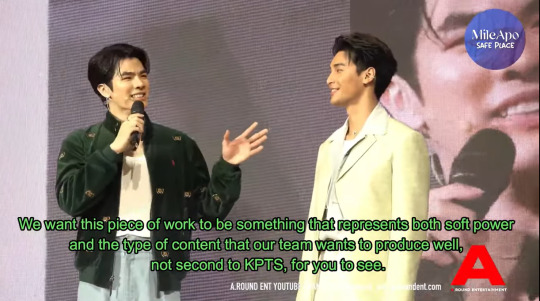
Mile talking about the film on 2022/9/24 at the D7 Grand Opening (vid/txt)

"Nong Po will act with Hia Mile -- please look forward to this movie next year, please look forward to that a lot. We want to expand Thai culture and soft power..." Apo on the Thai period movie at the KPWT Send off on 2022/9/11
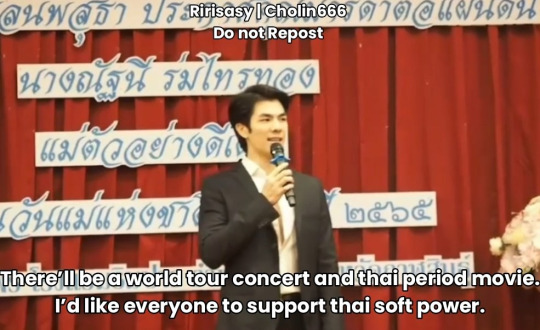
Mile Phakphum's speech on Mother's Day in Kalasin, 2022/8/5
Here's what we do know. Apo's dance training for the film is with a teacher affiliated with the academy that also produces dancers who specifically entertain the royal court.
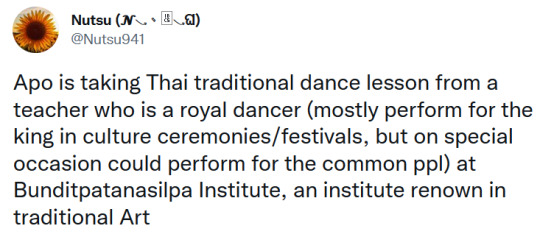
And here is what they individually said in the Vogue Thailand print interview (completed in late August 2022, published October 2022)
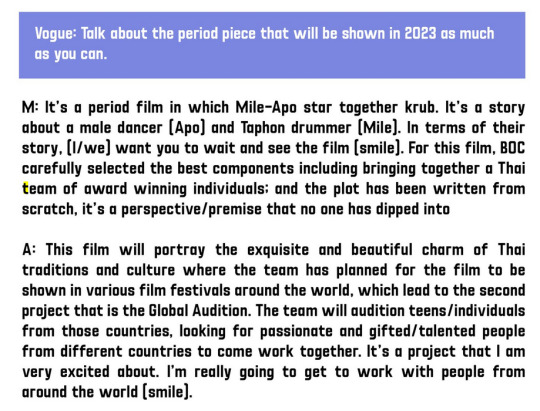
And I would be remiss and dishonest to not point out that Mile's family is prominent in Thailand and his mother is part of the Queen's inner circle. Keep in mind that Thailand is a constitutional monarchy where the monarch has limited powers in practice (think: Japan or UK), and Thailand has a history of cyclical political instability that does not displace the monarchy. So believe him when he says he has limited power compared to Kinn. He travels on a private citizen's passport like all the rest of the cast. (Though my eyes start watering when I'm thinking about baby chaebol CEO Mile and destiny.*)
That being said, what these connections likely did get the production team was access to cultural resources such as the dance expert and most likely credentialed historians to consult on the period film. I would surprised if there aren't ministers' offices who are in the loop about film's production in a way they would not pay to other film or show production teams. I'm sure we will find out more about the interesting and important people involved in the production process around the time the film is released.
Another aspect that stood out to me is the fact that Mile and Apo, neither of whom have policy backgrounds, started iterating the discussion point of soft power in a way you don't see Milli, or Mew Suppassit (who let's not forget was also a RSIFF invitee and the first Thai artist to break into the Billboard World Song Chart), talk about it. Mew actually has talked about soft power a couple of times, but only in the context that he is part of a cultural wave that can increase Thailand's influence globally and never specifically in relation to a project he is promoting. That speaks a lot to the team behind the scenes involved in the writing and consulting (and marketing) process of the 2023 historical film.
The timeline of when these comments popped up is also interesting. While they do coincide with the release of the trailer post KPWT Bangkok, most likely what's happening during this time period is that BOC and more specifically Mile is shopping for sponsors to the project.
Think about Mile speaking about Thailand soft power to an audience of mostly older businesspeople at the mother's day event -- what would the purpose be except an ask for partnership on a project that he is on, which can become a vehicle for Thai products both domestically and globally? Look at the timing of the announcement of the Srichand partnership (end of August), and how successfully that broken the brand into the lucrative Chinese market, moving millions of THB worth of product for a brand that had struggled to get any traction previously. While Srichand's focus is currently on China, working with a Thai beauty brand for a film where the trailer highlighted many historical makeup elements is an actually ideal brand partnership and project alignment.
(Sadly for us, I don't think the film will be the second longest bread commercial in existence. But based on the Farmhouse CEO's comments, I would be unsurprised if they signed on to support the film project too. Ancient Thai bread I guess *jazz hands*)
In Conclusion
MileApo's soft power talking point was an intentional move specifically to shop the film project around for sponsors. The Srichand partnership proved MA-as-a-brand's ability to move product in a lucrative, hard-to-crack foreign market, though Srichand (and Giffarine) as brands aren't necessarily able to stand in the market independently as of yet. Their past brand partnerships' success simultaneously showed how lucrative it is to book MA for a product domestically. I'm sure we'll see a slew of new interesting sponsors and brand partnerships this year. This is only the beginning of MA's power as a cultural brand domestically and internationally.
Mile and Apo have also expressed their pride in the past in being cultural ambassadors of Thailand, both at the RSIFF and when speaking about engaging tourists who are visiting Thailand. Their praise of Thai products (for example, the artistry of Thai silk in the Vogue Th Gala interview) and their active choice to work with mostly Thai brands speaks to their values as businessmen who genuinely want to uplift Thailand's influence in the global market.
That being said, the Thai cultural ministry cannot rely on a single cultural emissary to advance its soft power agenda globally, and as of right now, despite ...some attempts, a cohesive government strategy around soft power does not exist.
MileApo have demostrated their brand has strong impact, and that they can influence purchase behavior internationally (e.g., KPWT ticket sales, Srichand) in ways many Thai media figures have not been able to as of yet. But they are not formally tied to the Thai government, nor should the government intervene and attempt to direct artistic expression.
Culture is one aspect of soft power, and political/humanitarian expression is another major component that advances an international soft power agenda. There are already articles discussing Thailand's problems of political corruption and self/journalistic censorship due to political conditions that prevent full freedom of expression. But that's the government's problem to address that. There is a lot of unharvested potential in multiple realms.
This essay is not about that though. I'm just a fan.
Can it be December 2023 yet 🥺
Additional notes that don't fit into the essay under the cut:
(1) There was a lot of fandom hand-wringing in August and September about Apo publicly having working dinners with Pond over the film project. Let's not forget Mile is someone who cares deeply about the art he makes, and he and Apo both have said multiple times they talk almost nightly about their artistic intent. If Mile talks to Apo and Apo was talking to Pond, why would Mile, a person who cares deeply about art, not be talking to Pond in pre-production? Obviously the answer is a division of labor in the relationship: Mile was working on funding which is just as important, and Mile also needs to sleep and rest and not work. There wouldn't be anyone else he would trust to convey his artistic intent to the director except for Apo. True power couple behavior right there.
(2) * everyday I go feral over baby chaebol CEO Mile. If someone made a kdrama about a handsome chaebol baby who was a CEO but also an actor and model who met his soulmate in university but it was a missed connection and then the soulmate went on to become a famous actor/model who quit because of bullying, but then they met again when the baby chaebol WHO IS STILL A CEO BUT ALSO AN ACTOR met at an audition for a drama... *foams at mouth* I would call this show bizarre, nonsensical and incoherent, and yet HERE WE ARE IN REAL LIFE. The jetsetting supermodel with wealthy CEO part of reality which is now bending around MileApo so they can live their wattpad fanfic life. What the hell am I looking at, I ask myself every day.
(3) ** this statement does not include billionaires like Elon Musk or Jeff Bezos whose net worth exceeds those of small and mid-sized countries. Per today's estimate, ~50 people/families have more wealth than 90 of 190 countries. If your net worth can run the economy of half the countries in the world, then your wealth/resources hoarding behavior can control what the media says and influence otherwise free and fair elections.
Once again, Some of you need some contextualization of how comfortably wealthy vs. billionaire resource-hoarding rich looks like.
#mileapo#mile phakphum#apo nattawin#political science#soft power#international relations#thailand#thailand soft power#kinnporsche#mileapo 2023 film#if you like it give it a reblog#i spent so long on this#like twice as long researching as writing#if people don't like this one i'm gonna fr cry#business analysis#business#business case study#vogue thailand gala#vogue thailand#mileapo x vogue#kinnporsche meta#mileapo meta
602 notes
·
View notes
Text
Some Julius Caesar x The Danton Case Parallels to Celebrate the Ides of March, Frev Style 🔪🥳
Firstly, both Przybyszewska’s Danton Case and Shakespeare’s Julius Caesar are obviously (excellent!) tragedies that are set in a dying republic on the brink of collapse.
Here are some other interesting parallels I was able to trace:
1. Brutus and Robespierre:
Both of them are driven to execute an important figure even though they initially do not want to do it. They are both conflicted but feel like they have no other choice and have to commit the violent act for the good of the republic.
They are also arguably quite alike in terms of character: you have the „noble Brutus“ and then Robespierre, who is consistently referred to as „the Incorruptible“. Both are seen by others as selfless and committed to the good of the state (the people in the crowd very much emphasise this fact in both of the plays, I do have the receipts)
There is even the scene in which Brutus chastises Cassius for taking bribes, which plays into the idea of him as being (literally) “incorruptible” as well. And vice versa, traces of Brutus’ famed stoicism can then certainly be found in Maximilien.
2. Cassius and Saint-Just:
Both are characters who convince the protagonists (Brutus/Robespierre) to go along the violent act while not necessarily being portrayed as antagonists (at least Saint-Just definitely can't be seen as one in Przybyszewska’s play).
There are also parallels in the close relationship between Brutus and Cassius and Robespierre and Saint-Just, where they are very much portrayed as each other’s closest confidants. Of course, this idea can easily be pushed even further if one wishes to read between the lines. (There is no Camille Desmoulins in Shakespeare though)
3. Manipulating the Crowd:
I'm perhaps the most fascinated by how both Brutus and Mark Antony as well as Robespierre and Danton have the necessary rhetorical skills to manipulate the crowd of commoners (Robespierre being able to “play the crowd like an organ” very much came to my mind when I was reading Act 3 Scene 2 of the Shakespeare’s play).
Both Shakespeare and Przybyszewska portray “the court of public opinion” and how it can easily be manipulated - how opinions can be changed in the matter of minutes - in a way that is genuinely fascinating.
Specifically, the similarity between A3S2 in which people first listen to Brutus only to be immediately swayed by Mark Antony’s speech shortly after and the scene in the court in which Danton manipulates the crowd were in fact so similar in some respects that it was borderline uncanny.
The problem arises when looking for a mirror to Danton’s character in Shakespeare’s play.
4. The Case for Danton x Caesar:
It is Caesar who gets killed for being perceived as a danger to the republic
Both Caesar and Danton are portrayed as being very much beloved by the common people
Also, the idea of Danton being immortal is expressed at the end of Przybyszewka’s play, and while he does not come back literally as a ghost like Ceasar does, Robespierre nonetheless explains to Saint-Just that Danton’s spirit never truly dies.
5. The Case for Danton x Mark Antony:
If we see Danton and Robespierre as foils, Mark Antony makes more sense as a parallel to Danton (even though he does not die), since both Robespierre and Brutus as the classic ascetic/stoic archetype while Danton and Mark Antony’s are well-known for their appetite for drinking, women (or, you know, people, in the case of Mark Antony) , and the pleasures of life overall.
Both are also severely underestimated by their enemies at first, yet they prove to be quite cunning and are able to use their words skilfully to win over the public
Overall, reading both of the plays – especially the parts about manipulating the Roman public and the citizens of Paris just with the power of words – really makes me wonder if Przybyszewska read Shakespeare’s play and used it as a source of inspiration. It would make sense, especially given how the parallel between the French Republic and the Roman Republic was well-established long before her time (even, somewhat tragically, by the revolutionaries themselves).
I promise I think about Przybyszewska's and Shakespeare’s play and the Roman Republic along with the French Revolution a totally normal amount of time & that it definitely does not consume my every waking thought that should be very much going towards the exam preparation.
#ides of march#julius caesar#brutus#french revolution#maximilien robespierre#the danton case#stanisława przybyszewska#william shakespeare#mark antony#literature#classic literature#english literature#literary analysis#(attempted)#marcus junius brutus#georges jacques danton#antoine de saint-just#saint just#robespierre#frev#frev community#history#renaissance#tagamemnon#classics#roman republic#ancient rome#classic studies#you can tell this was not AI generated by the fact that it is so chaotic and at times barely coherent#but there is heart in it okay
67 notes
·
View notes
Text
at first meeting celia I thought "ohh I think Alice and celia will fuck" and THEN after the ending I'm like "Alice and celia are DEF gonna fuck and this will be so messy"
#can't wait to see what celia introduction will bring to the dyhard ship dynamic#AND the Alice x Sam (what even is their ship name /gen)#don't get me wrong I'm still a hardcore dyhard#but 👁️👄👁️ DRAMA#you could never expect deep analysis from the cases and lore of this podcast from me but SHIP DYNAMICS?#I'll study these characters relationships with a mycroscope#tmagp vague#tmagp 6#tmagp spoilers#alice dyer#gwen bouchard#samama khalid#celia ripley#dyhard#Alice dyer X samama khalid#tmagp
50 notes
·
View notes
Text
Knowledge in VNC : About Noé's eyes
So, we all remember that when Noé was very, very young he was injuried in one of his eye right ?
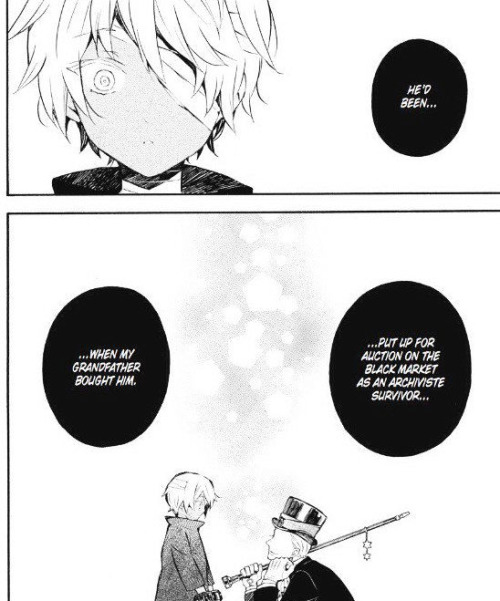
While people wonder why his left eye specifically, I might have the answer to this.
In latin, left is said "sinister" but in french it gave the word "sinistre" which means omnious and therefore lead to countless surpestition of left briging you infortune, on why you should never eat with your left hand, or that the wrong decision is always to choose the thing in the left etc. This comes from the Greek since Roman saw the left/sinister as a sign of good fortune and since VNC is full of latin/french reference it might be why.
Anyway, that answered. I'd like to point out something. In the Opening 1 of VNC, 空と虚/The sky and the void, towards the end of the 1st chorus, those lines are mentionned :
その目に僕は見えるでしょう?But those eyes can see me, can’t they?
You migh wonder why there would be such a focus on vision. Well, for a long, long time vision is associated with knowdlege which is why the word "blind" can have the literal meaning of not seeing things and the figurative meaning of not seeing them in the sense that you are ignorant about it despite the answer being right under your nose.
So to explain this I'd like to use two mythological reference : Oedipus and Tiresias.
Oedipus is know very infamous for giving it's name to something Freud called Oedipus complex, but in Sophocleus's tragedy, Oedipus king, there is an interesting play between the vision and the knowledge thanks to the use of the verb σκοπέω/skopeo which both means to see/to observes and to judge/to think. Hence the play shows us an Oedipus that has the answer to the question he has at the begining reguarding Laios's murderer and the fact that his wife Jocaste is actually his biological mother, but he doesn't see it, he is figuratively blind which causes him to not see in the sense of him making terrible decision and when he finally begin to see the truth, he is crushed by reality which causes him to blind himself literaly, saying that he is now as blind as he used to be at the beginging of the play. I could go on with this due to how interesting this auto mutilation act is, however I am supposed to focus on VNC.
Following this logic, I think that Noé's "bad eyesight" is mainly symbolic to how he is blind to some things of the world. At the begining of the story, he is mainly a child at heart, an innocent and well intentioned young man. He is pretty much a white page, he doesn't know the reality of so many thing and concept such as love or salvation. His vision is cracked to shows how much of an unreliable narrator he can be. We already had many instance of Noé's vision on an event being portrayed differently. See when he met Vani for the first time :


VS in chapter 52


We may wonder why it changed right ? well, it's because Noé vision/perception of things is shaped by what he knows of it.
An example of this in the Ball masqué arc
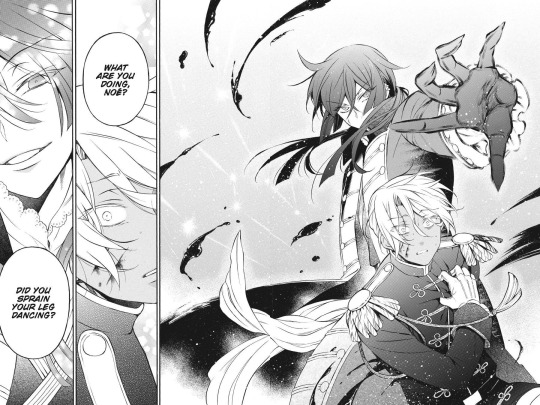
That's how Noé sees Vanitas. He is portrayed as radiant here, and the reason isn't just because he saved him from Naenia, but because Noé saw Vanitas saving several vampires using the Reverse operation, which gives him hope.
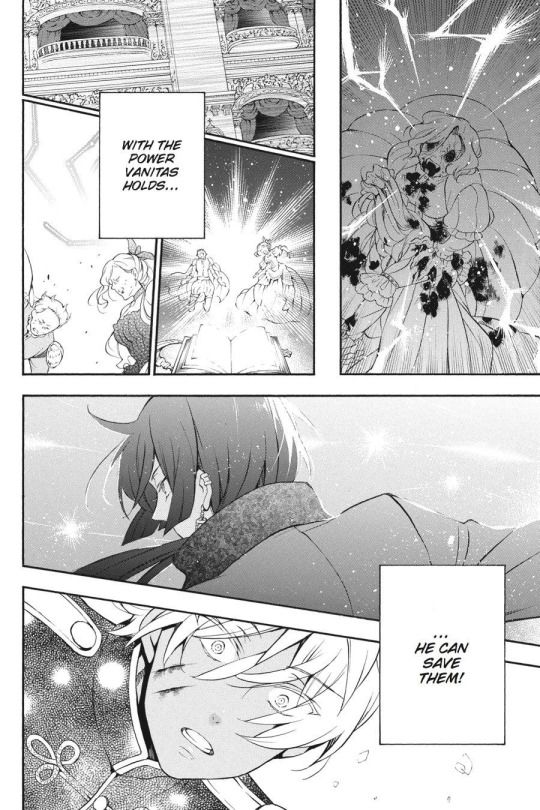
Vanitas is seen as a saving figure because it restored Noé's hope. After all, he experienced the loss of his childhood friend due to Curse bearer degeneration and this happen right after Naenia made him remember that.
However, when Vanitas fails to save Catherine and kills her instead, the portrayal/way Noé's view him changes
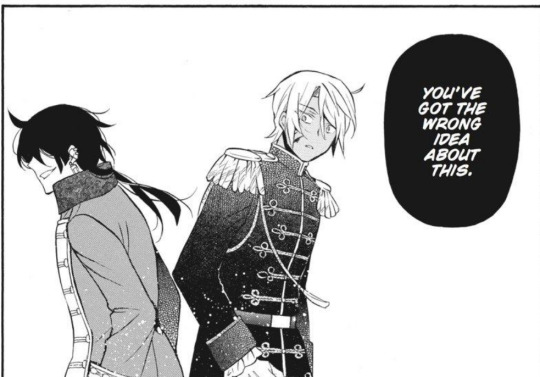
Vanitas's dialogue is in a dark bubble leading to understand the dialogue has a dark connotation which worries Noé creating a transition
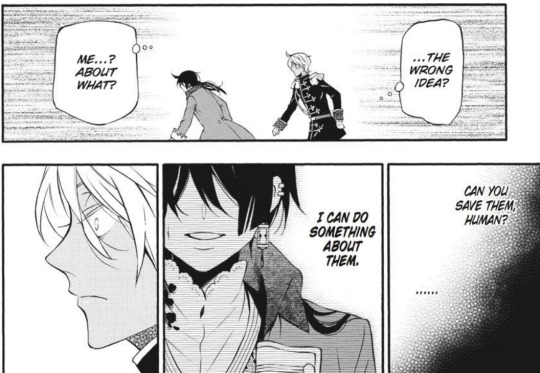
The panel where darkness seems to be growing and thus contrast with the light panel where Vani's hair shines brighter with the use of trame; replaced now by ink to signify darnkess as taken over, and here it's in Noé's vision.
When we are at the point where he will kill Catherine, Noé becomes more hesistant, the look on the panel showing his anxiety and then

He remembered the face Vani made when he claimed to save all the Vampires but with the dialogue he said a bit earlier, and while many commented on how threatning this face is, the fact that Noé remember this face right as Vanitas is about to kill Catherine says a lot on how he ended up viewing him very differently from the moment Vanitas saved him.
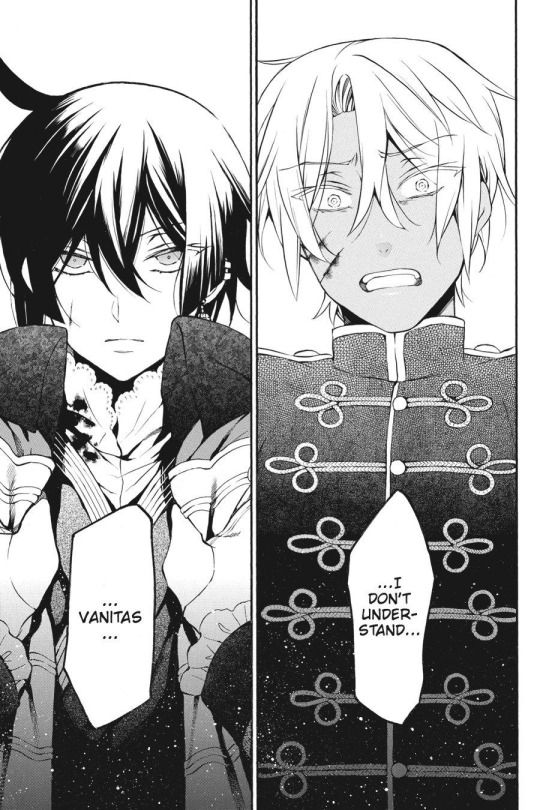

With this example, you can see that Noé's perception is limited to what he knows of the thing he see, modeling how he sees things.
By the time of chapter 52, Vanitas could have once again appears in his soft side, having saved Chloé and having Noé learn about his own insecurities. But in this chapter, Vanitas threaten to kill his childhood, friend, hence he doesn't view him anymore as the same and is unable to focus on him. An blatant example is how he failed to notice that Vanitas made this face when he tried to attack him.
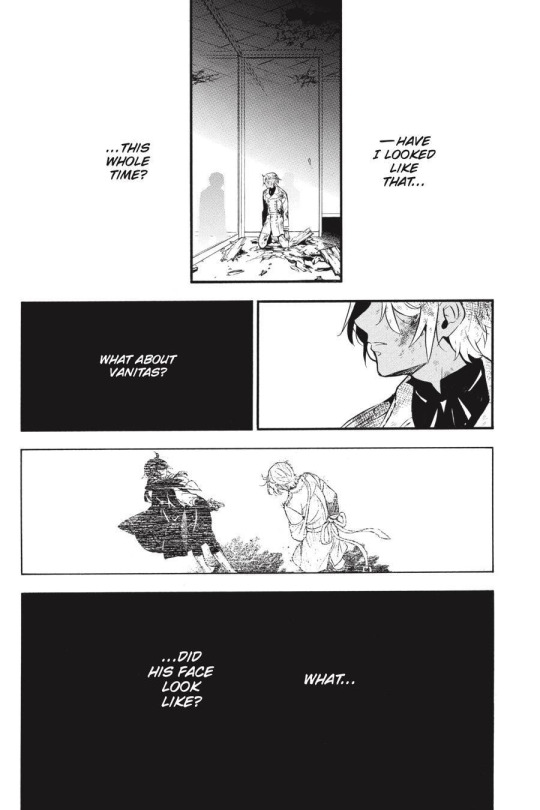
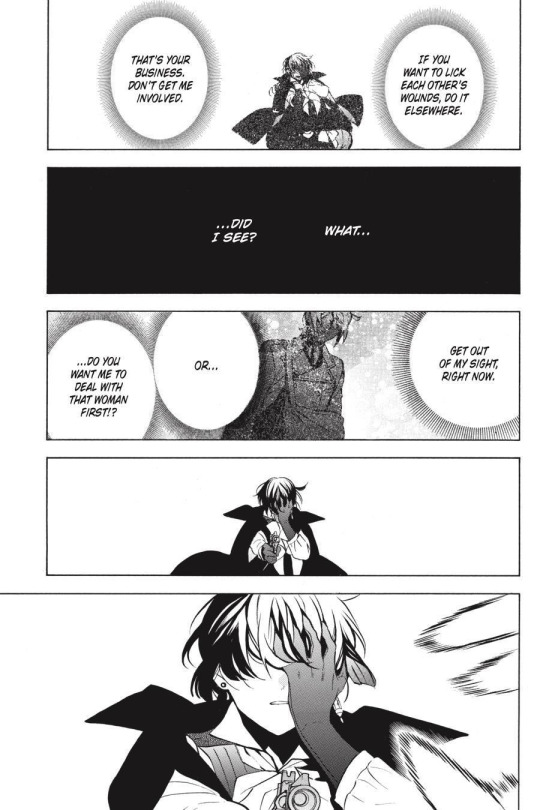
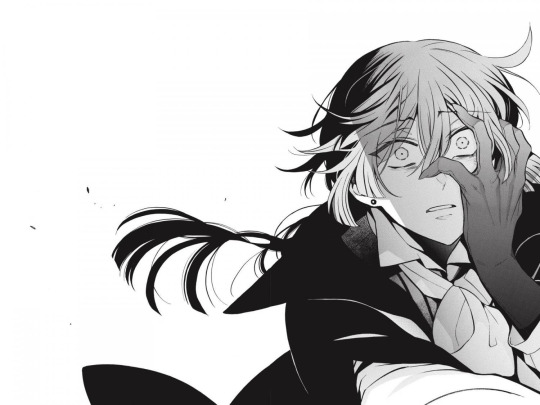
He will admits it himself, but it isn't before Jeanne, an objective watcher call hims out

That he snaps out. And even then he doesn't understand
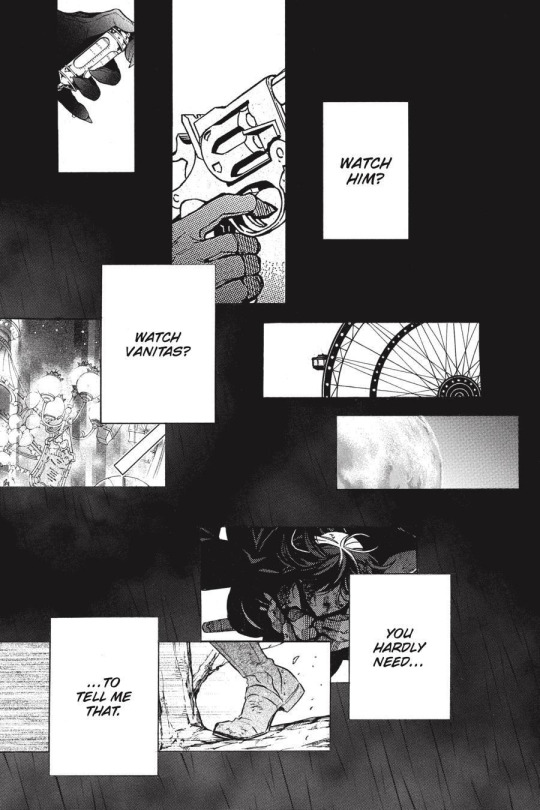
Until he sees himself in the mirror

The fact that Noé's vision of Vanitas is shaped by what Vanitas let him see of him, coupled by his blind self makes him an unreliable narrator, especially when it comes to what VNC is about : knowing who Vanitas is.
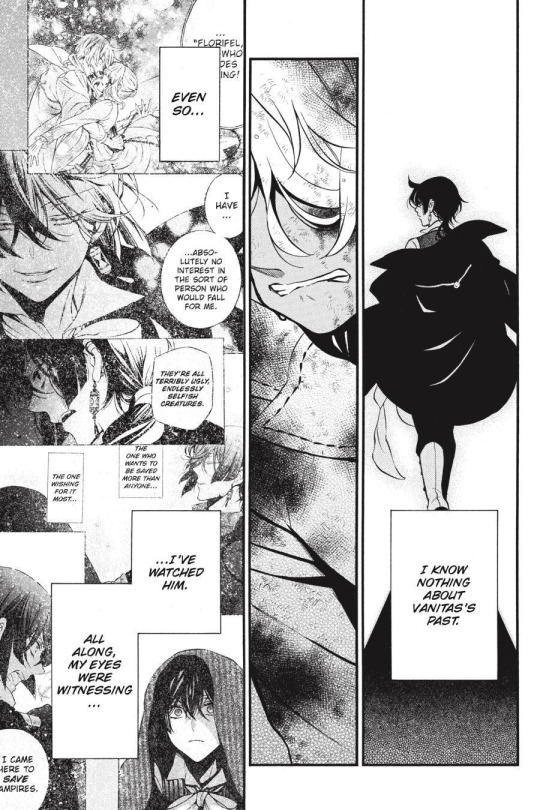
Hence, I think Noé's eyesight is actually refering to this element, that he is figuratively blind. At least for now.
But it should also be noted that Noé and Vanitas don't view the same thing in the same way as they have different knowledge of it and I think nothing illustrates it better then their duet song, Le Formidable where the chorus goes as such :
I walk into this
useless (Vanitas)
wonderous (Noé)
world
The chorus and some of the verse are constantly showing the dichotomy of how these two sees the world, contrasting between Noé optimism view and Vanitas's pessimistiv view, and the two untertwining creates a sense of discontinuity within the lyrics as the song keeps switching between their 2 POV which is complete polar opposite and this is more notable when the song comes to the chorus where both voices finally sings together and seems to have finally meet, but to show that while they live in the same world and lives the same adventures, they don't view things in the same way.
Now talking about Tirésias. He was a mythic poet that was cursed with blindness but the gods granted him in compensation the gift to see the future and he became a famous fortune teller. This is actually linked to an old, old belief about blindness. That although they can't see, the are gifted with a knowledge unabling them to see what is invisible to the common man. And while blind people often have sharpended sense, this is also linked to the old belief that the poet as prophetic talents.
So how does it link with Noé ?
Noé is actually an entity that is double : with have past Noé, the character and present Noé, the narrator/writer of the story. Past Noé is blind, but present Noé, while a potentially unreliable narrator is the one that knows how the story ends. After all, the end of chapter 1 sounds like a premonition.
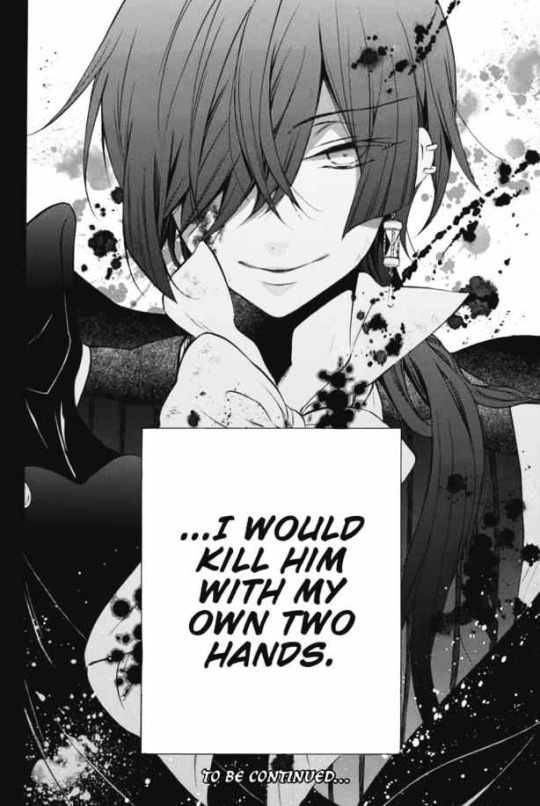
And that's because it already happen. Like for Oedipus that couldn't escape his fate, the story Noé is telling is bound to end like that because it's what the narrator already experienced. There is that critic Jean Paul Sartre made about true stories not existing arguing that the moment you tell a story when you know the ending of it, it cease be authentic because we don't know how things are supposed to end. And indeed, no one but God can know what will happen in the future. It is what is name the occult, ot "what is hidden"... what people used to believe blind people could see as compensation for their defective eyesight.
That add up to the fact Noé was shown to be literaly defective within his eyesight due to his injury. But canonically Noé has the power to know something that others vampire in particular can't. As an Archiviste, he can knows the past of someone by drinking their blood and looking into their memories, which got him to have a lot of people looking down on him for that has it's allowing him to look on what is intimate, etymologitically, what is deep inside of them, that which they occult. And in the case of Vanitas in particular, it's something that 1/ Vanitas don't want him to know 2/Noé admits in chapter 52 to not know.
However, as I mentionned the narrator knows the ending of the story, which contrast with how Noé is ignorant of the events of VNC compared to his future self narrating the story. And in chapter 56, there is finally a hint of him learning his irremediable fate
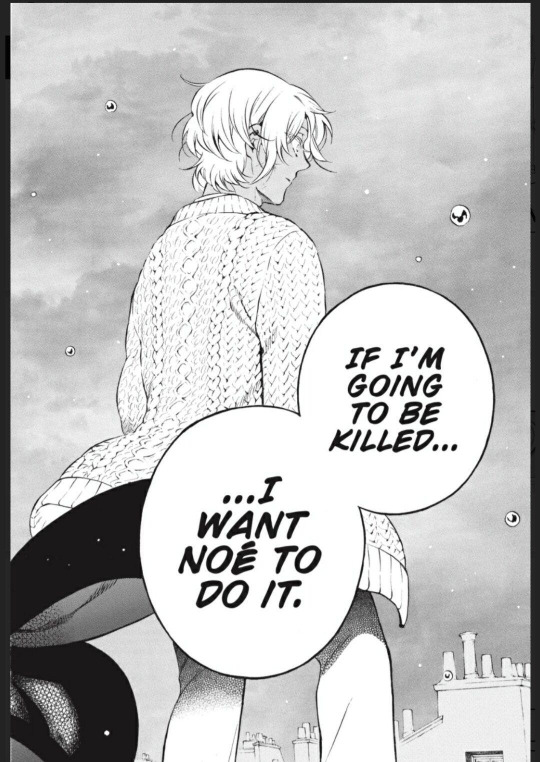
From the mouth of Vanitas, Noé learns what is future self already knew and told the audience.
This might be an indicator that Noé will manage to pass of his initial blindess as he tells the story and thus recover a proper eyesight, signifying be able to see things other then through a veil of ignorance/innocence/subjectivity.
And this can be seen as through VNC, there are clear instance of Vanitas moments focused when Noé was simply not here, and thus should not know about it, specially when Vanitas nevers tell him about it, such as his meeting with Jeanne at the ball, his discussion with her during the lunch Lucas invited them to partake, their meeting at the ball, their date in Paris or in the cabine.
There is also the fact that he relates his meeting with Ruthven in the meantime, when he should have forgotten about it. Or, the most obvious piece of evidence, the fact that he was able to convey how Vanitas felt when he attacked him even though the chapter made it clear Noé had no idea on how he looked like
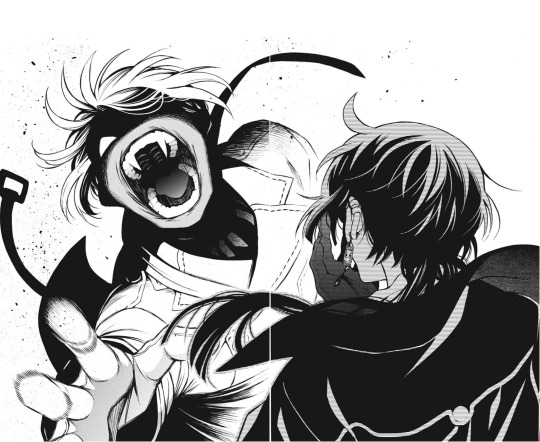
This for instance, shows that Noé/narrator was able to overcome his own biais and overcome the fact he would have remained an unreliable narrator had his vision not changed.
Long story short is that Noé/narrator knows and see what Noé/character doesn't know/see and shows us the ignorance he had at the time, while keeping in mind that Noé/character doesn't know while Noé/narrator is the one who knows everything. What is going to happen, how it is going to unfold.
Thus it is very important to remember that what Noé/character sees will constantly be challenged by what his future self saw and therefore knows.
And considering that VNC heavily deals with how Noé's vision of the world is constantly challenged throughout the story, I think it is possible that his character would evolve in such a way
#vanitas no carte#the case study of vanitas#vanitas no shuki#jun mochizuki#noé archiviste#meta analysis#manga analysis#greek mythology
99 notes
·
View notes
Text
im very normal about fuuta in general but i dont think im ever going to emotionally recover from his fire motif and what it represents for his character and how he reflects the greater theme of justice so that means i must rant about it
(more under the cut because this got longer than i expected whoopsies)
so anyway fire is pretty obviously supposed to be symbolic of his passion for justice right? that fire is all over the place in bring it on. he's wielding it to take down enemies, his signature weapon is a flaming sword. it's what he uses to lead the campaign against the people he's after, the people he's deemed in the wrong.
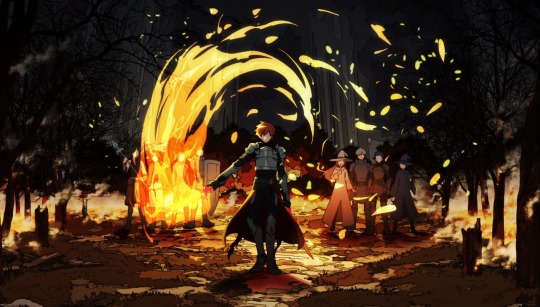
it's a fucking flaming sword, it's badass as hell!!!! it's what a hero of justice, a knight, would use!!!! it's cool as shit, it's his symbol of justice.
that's how he sees his justice in trial 1.
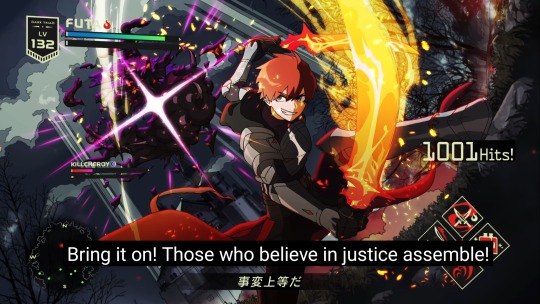
he's righteous, he wants so badly to believe he was a hero, he was doing it all for a good cause, for justice. his passion for justice was a tool he used to meet those ends, to be a hero, to wave it valiantly in the face of enemies.
the fire, however, is conspicuously absent once he's noticed the blood on his hands
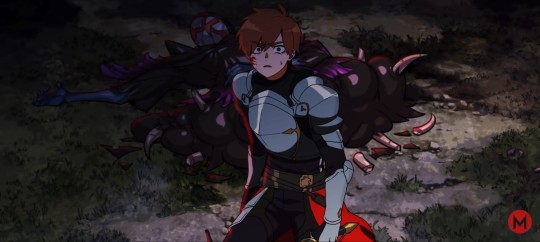
interestingly, despite backdraft as a song title being much more related to his fire motif than bring it on, fire is actually surprisingly absent from the mv's visuals. fire, as in actual orange burning fire, doesn't show up much at all in backdraft except for when both fuuta and his victim begin turning to ashes, and a short bit near the end right after the last chorus when the spraycan explodes in fuuta's face. you know what the mv does show a lot of though?
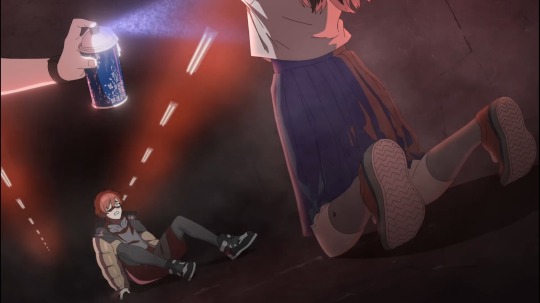
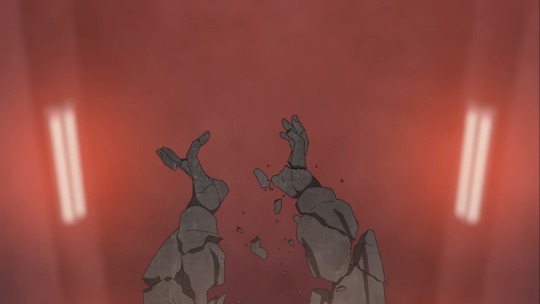
smoke. and ash. the byproducts of a fire, the byproducts of fuuta's passion for justice.
bringing it back to firefighting for a moment: as many people have already pointed out, backdraft as a firefighting term refers to when a fire that has consumed all available oxygen suddenly explodes when more oxygen is made available, such as when a window or door breaks. the thing about fire hazards, though, is if the fire and the heat don't do someone in, usually it's the smoke. the smoke inhalation causes breathing difficulties and suffocation, making it even more difficult for a person to escape the fire.
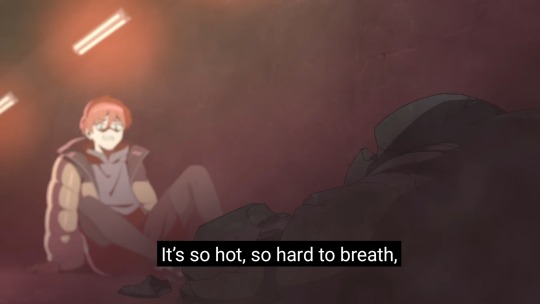
in backdraft, instead of fire itself, what we're shown is these byproducts of a fire. the smoke is damaging to human health, and the ash shows that the fire has burned things up and caused destruction, in this case killing someone. all we're shown is the negative results of a fire, in sharp contrast to its badass, positive portrayal in bring it on.
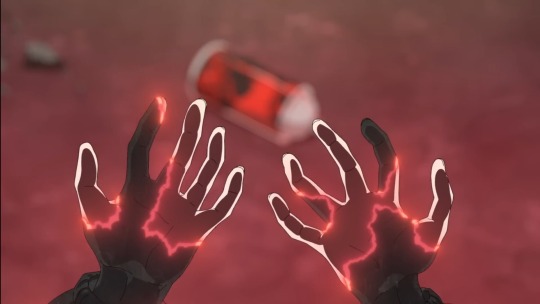
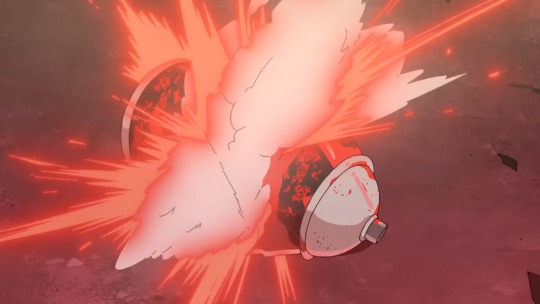
hell, even fuuta himself starts turning to ashes and the spraycan explodes in his face, showing how even he is experiencing the negative results of a fire that has gotten out of his control, how even he has gotten burned by his passion for justice. or, is it es' desire for justice?
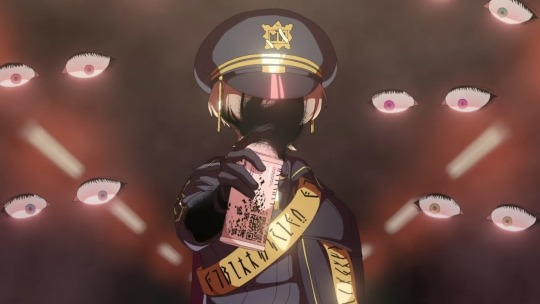
translation of fuuta's t2 vd by onigiriico
Me, too! I was like that, too! I also didn't think it'd turn out that way!
You and I are exactly the same breed! The only difference between us is the clothes we're wearing.
fuuta's justice and es' justice, it's all the same in his head now, he directly tells es that they're the same, that we're the same. it's all the same hunger for justice that ends up causing harm even if that wasn't the intention.
you know that saying that fire is a good servant but a bad master? i think that's pretty applicable to fuuta's situation. his passion for the pursuit of justice was great when it was still a tool, a sword he could wield, after all he did manage to shed light on some people's wrongs and bring them to justice. but once it exploded, when it became a backdraft that even he could no longer control, it did more damage than he intended.
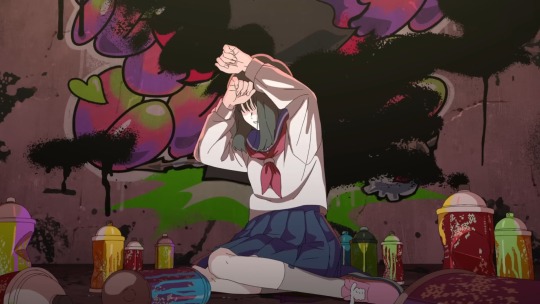
it burned even him, it killed a middle schooler. and he recognizes that in backdraft. he only shows us the ways fire that becomes a hazard can go wrong.
translation of fuuta's t2 vd by onigiriico
What did I do? All I did was say that what's wrong is wrong! I was just going off at a bad person online!
I didn't think they would die! I just thought that wrong things are wrong, and that a crime is a crime! You get that, don't you? See? Aren't we the same?
it's just. fire is such a good metaphor for the message of fuuta's character and his arc. it's an amazing illustration of how dangerous it is when you feed a desire for justice too much, when you forget to put a boundary on how you handle that fire. eventually the fire spreads just like how passion for justice becomes zealotry, until more and more things fall under what you consider to be 'punishable' by your standards and goes out of control to hurt people that probably didn't deserve it. it's a warning to set proper boundaries on our own definition and desire for justice and what's 'right' so the good intentions doesn't spiral into harm. it's a reflection of our attitudes towards milgram as the audience responsible for their justice and forgiveness. it's amazing i love it i love fuuta's fire symbolism i love fuuta's character arc and i love milgram's writing so so so much
#milgram#fuuta kajiyama#im sure someone has already gone through every point in this post before but i was having fuuta thoughts and they needed to go somewhere#this might be super disorganized this is essentially the first draft and i kinda just word vomited lol#anyways i love milgram i love picking it apart for its themes#tangentially i might do another whole thing comparing fuuta to kotoko but hm not sure if i can add much to that discussion#maybe after deep cover comes out#i actually really like kotoko for similar reasons to fuuta actually she's an interesting case study of a desire for justice that corrupts#anyways sorry this wasnt that deep an analysis or anything i mean i didnt even pull up images it's a glorified rant more than anything lol#hm might edit this post to add images tomorrow ill see if i remember
91 notes
·
View notes
Text
Shaping Perceptions: Brand Positioning in Wealth Management
Explore our case study on brand perception and strategic positioning for a prominent wealth management company. Witness the art of building trust and value in financial services.
#Wealth Management Success#Brand Positioning Case Study#Financial Services Branding#Perceptions in Finance#Case Study Analysis#Wealth Management Strategies#Successful Branding in Finance#Client Perception Management#Strategic Positioning in Wealth Management#Branding Success Stories#Financial Industry Case Study#Effective Brand Positioning#Wealth Management Marketing#Case Study on Financial Services#Building Trust in Finance#Positioning for Success#Brand Image Enhancement#Case Study: Investor Perception#Wealth Management Brand Evolution#Strategic Brand Management in Finance
0 notes
Text
Sora: Expectations vs Reality (Coded vs KH1, CoM, and 3D)
Another Sora analysis because I can't help myself haha (help). But there's been a couple of posts that talked about this topic and it's really rewired my brain, so I also want to take a stab at it. I feel like this isn't something that's looked into/analyzed as much compared to other interpretations of KH's narrative, especially in terms of Sora, or at least I haven't seen it as much across platforms in a mainstream sense (though I do think it's been on the rise in recent times).
So if you're willing to bear with me, then get ready for another long post!
As the title indicates, and as mentioned, other people have brought up, Data-Sora creates an in-universe (and IRL) set of expectations for the actual Sora. While Coded is technically a rehash of KH1 and CoM's plot to an extent (hence its reputation besides its amazing gameplay), the point is to gather and present the stakes KH2, Days, and BBS introduced and set up what Sora's goals are going to be leading into 3D and 3.
The way it chooses to do so is to put a simulated Sora to the test, to see if he can "handle the hurt" and while he manages to do so, as many others have pointed out, Data-Sora's decision about remembering the pain to connect to others contradicts Sora's decision to forget at the end of CoM. Coded dictates that Sora can handle the pain of those within him and/or those who need to be saved. But 3D contradicts that as well. Many say that this indicates a potential point in Sora's development as a character and person, and while I agree, I want to focus on what has shaped him to this point in the first place. I must add, though, that Sora in 3, in terms of what he knows/is aware of by the end, understands a lot more than I've seen some people give him credit for, but this is another opinion in of itself.
Reading full-on long paragraphs might make this even harder to get through so I'll try to place some parts in bullet points (I get info-overloaded easily sometimes due to long paragraphs too ToT):
Coded, as said before, while initially having Data-Sora find/fix the missing/corrupted data in Jiminy's Journal (KH1 aspect), turns into a test to see if Sora can handle the "hurt" of the people he needs to save (CoM aspect).
Data-Sora proves he is willing to take on that "hurt" and can handle it. Which Sora by KH3/ReMind also manages to show.
But this neglects a few things about Sora's character before that point:
Data-Sora in the first part of Coded has guidance from Mickey, Donald, Goofy, and Data-Riku especially D and G who have experienced their KH1 development and are currently ride-or-die for him. The KH1 experience ends up being different for him.
Even though he fights Data-Riku, it can be chalked up to the bugs/possession rather than anything malicious, which contrasts with real Riku before the Ansem possession.
Data-Sora losing his keyblade happened due to Maleficent rather than Riku. Rather than Goofy and Donald leaving him, he's the one that storms off and even then they go after him.
When we get to the CoM portion, Data-Sora doesn't have his memories of what happened in the first half, hence he goes straight to Castle Oblivion without the KH1 experience (also he's initially guided by Mickey, Data-Riku, and Data-Roxas)
In this case, it's a test of strength rather than what happened in CoM where Marluxia and Larxene hoped to break Sora to make him their puppet.
Data-Sora went to the KH1 worlds in each room and was made to forget right after getting through each one
But Sora had his memories from even before the first game actively messed with, while also being made to believe that it was the real Riku attacking him. All of that happened without much guidance from anyone.
What this shows is that while Data-Sora is the ideal outcome of Sora's development, I think as a narrative that presents trauma (intentionally and unintentionally), it emphasizes what the real Sora has been through. Theoretically, had things gone differently for Sora, and he had a proper support system on these journies, he would have been able to make the "right" choice. But he didn't have that. He had to figure a lot of things out and had to pull himself through. In a way, it feels unfair to some extent and it creates the expectations vs reality aspect.
And I believe this comes to fruition in 3D:
Organization XIII successfully overwhelms Sora, his heart ends up breaking under the emotional stress of all the people he's connected to as he's pulled into deeper sleep.
It especially sucks considering that the Mark of Mastery Exam was actively messed with in an outright attempt to break Sora (again).
His failure of the exam makes sense considering he couldn't overcome the Darkness in this real-world application like Riku, but it leaves such a bitter taste, right?
(The logistics of the exam can be argued ngl. Isn't it wild that all cases of the exam we've seen have had an external force get involved and have irrevocable damage on the test takers? Taking lives and souls fr.)
So what we get is a failure of those expectations (at least initially). Reality is much more harrowing and vicious. And that's such an interesting thing to do narratively, it feels purposeful. It establishes a depth to Sora that isn't fully seen and even adds to the concept of Data-Sora being his own existence by extension. By KH3, Sora's low self-esteem is directly shown to us and stems from the reality of his journey. He has a lot of unaddressed scars and while the characters view him as a beacon of hope out of love and respect, many of us acknowledge how harmful that's been to him in the most specific ways.
I really, really hope that the upcoming games build on this and address it, because it'd be so satisfying to see all of this acknowledged and explored! It would feel fitting for Sora to go to Unreality and face the reality of himself.
(I'm sorry if this was incoherent, I'm bad at collecting my thoughts on the spot...I'm open to corrections and additional thoughts!)
#kingdom hearts#kh#kh sora#sora#character analysis#protagonists like sora are interesting because mainstream perspective can easily summarize them as the same-y typical shounen protag#but in my experience with deep-diving into character analysis for these kinds of characters there can be a purposeful (or not) case#placing them on pedestals (or hating them) in-universe and by the audience. and while not every series that does this explores it#time and time again people do notice it and i can't help but appreciate that.#many of these characters do have their own nuance and by being upbeat and/or simple-minded in general it gets pushed under the rug#purposefully or by flanderization/simplification#it's a fascinating phenomenon to contemplate and study in real time#yoroshiu analyzes
20 notes
·
View notes
Text
Since I am such a normal individual I’ve decided to attempt breaking down vanoé’s character song “Le Formidable”. I don’t hear much talk about it but the lyrics are just as cryptic and wild as the OP/ED.
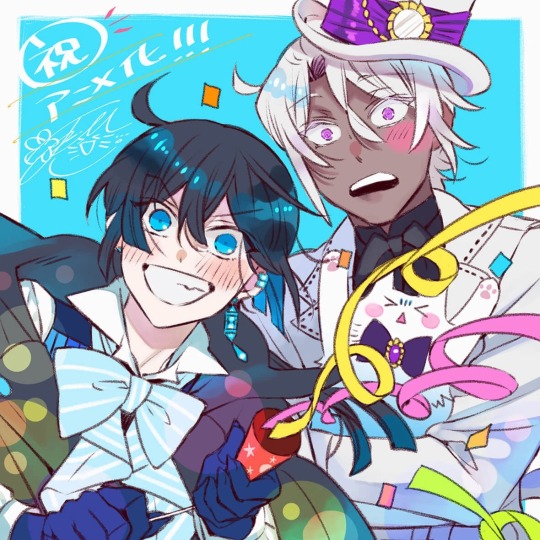
Before we get into it, in terms of translation, I could only find one on YouTube that thankfully color-coded the lyrics so I could decipher who sings what. If anyone has any other translations, I’d love to know please. So a bunch of the lines you can kinda figure out who’s singing but here’s how it’s gonna be:
Vanitas =💙
Noé =💜
Vanoe= 💙💜
Simple enough let’s get into it :)
💜: /I want to stay in bed feeling the warmth of the sun and drift in and out of this sweet dream/
Already we’ve mentioned dreaming, a running theme in this song. There is the well-known line Teacher says in chapter 55...
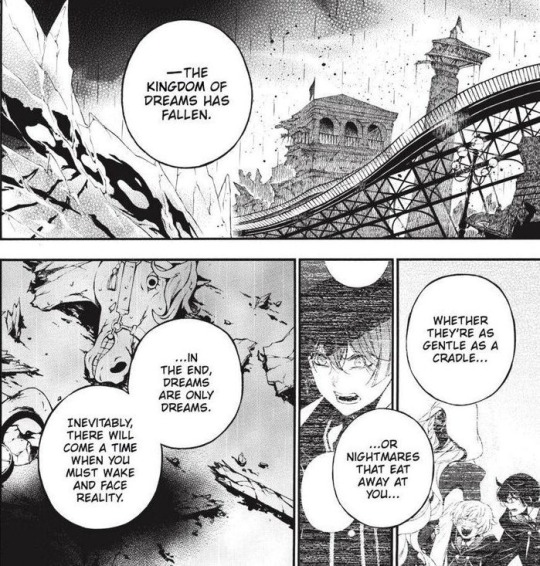
Sleeping, specifically in regards to Noé, is something mochijun makes the audience take note. He can’t sleep without holding something. When he can’t fall asleep, it is highlighted like the night Vanitas rejected Noé drinking his blood. He doesn’t want Vanitas to disappear and I personally like how in the recent chapter, Vanitas stays by his side for a while. Almost like callback to that moment on the train but I’m getting carried away. You get the correlation I’m making, it’ll get very important later on.
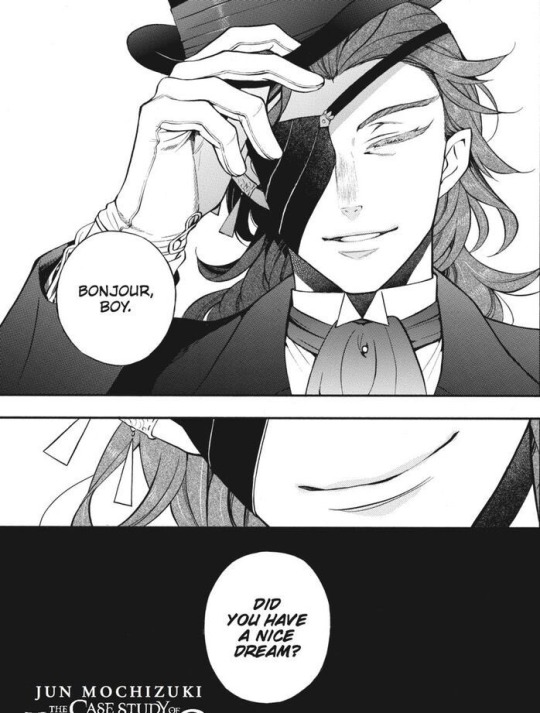
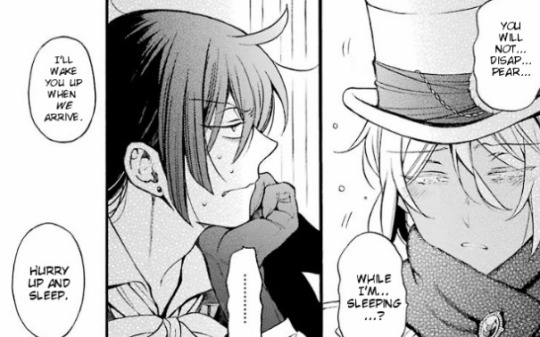
We also have those warmth and sun connections to Noé, a large part of his character and Vanitas’ gravitation towards him.
💙: /With this grey weather today, this day will go by without any harmony/
We see Vanitas’ pessimistic outlook on life; grey, cloudy, devoid of color. Devoid of comfort and obviously these two contrasting people will clash but mix together throughout the song.
💜: /Tarte Tatin, Altus Paris! Endless interesting things!/
💙: /It’s always like this! Here and there, endlessly losing sight./
This seems pretty straightforward, Noé is getting distracted by all the wonderful things as usual and Vanitas chastises him. But let’s frame this another way, Noé is choosing to not focus. It’s simpler that way. He’s turning his focus elsewhere to better things, more pleasant things. And Vanitas is trying to wake him up. I’ll explain more in my theory soon.
💜: /What to look for today from this city/
💙: /Ah with all these things/
💙💜: /There is no time to rest/
Simple lyrics here. No comment.
💙💜: /Le formidable! Le formidable! It’s really easy. Just colliding, rolling down, and repeating again/
Here we are entering the chorus. There’s a common thread of repetition in every OP and ED in VnC. Like clockwork, these two have fallen into this pattern.
Colliding- Vanoé meeting, two worlds learning how to come together, joining as one
Rolling down- their downfall, incoming despair and tragedy
Repeating again- they find themselves back where they started, fated to be born and to die
Let me say the first part of my theory and keep this in the back of your head while remembering the lyrics: VnC is not a time loop in the traditional sense but rather a loop of memories. Also keep in mind the first ED Zero: “Now I remember, oh I have never lived a day without you. Untie the layer of memories...”
💙: /This worthless-/
💜: /wonderful-/
💙💜: /world we are walking on. Even not knowing is sometimes nice, right?/
Again, vanoé with different outlooks on life meet each other. But more importantly, we see the display of ignorance or blissful unawareness. We the audience have a vague idea on how this story ends and in a way, so do they. Vanitas knows very well he is doomed and has already entrusted Noé to end his life if it comes to it. But we also don’t know the specifics of their downfall and neither do they.
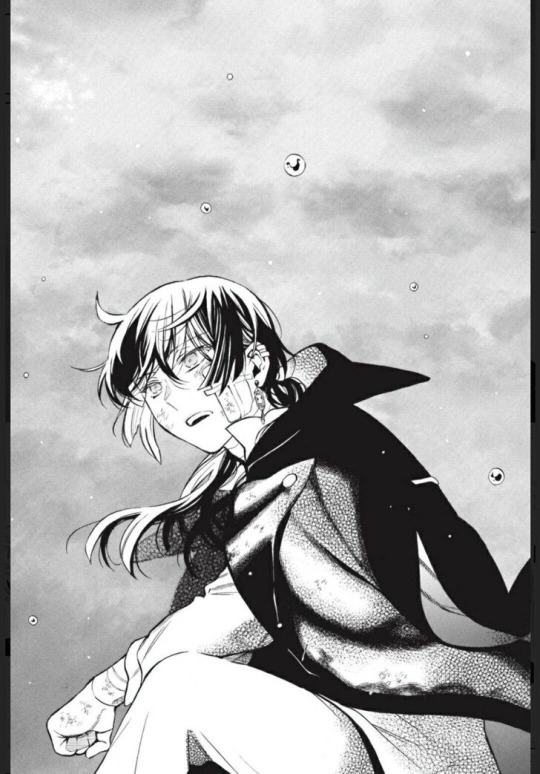
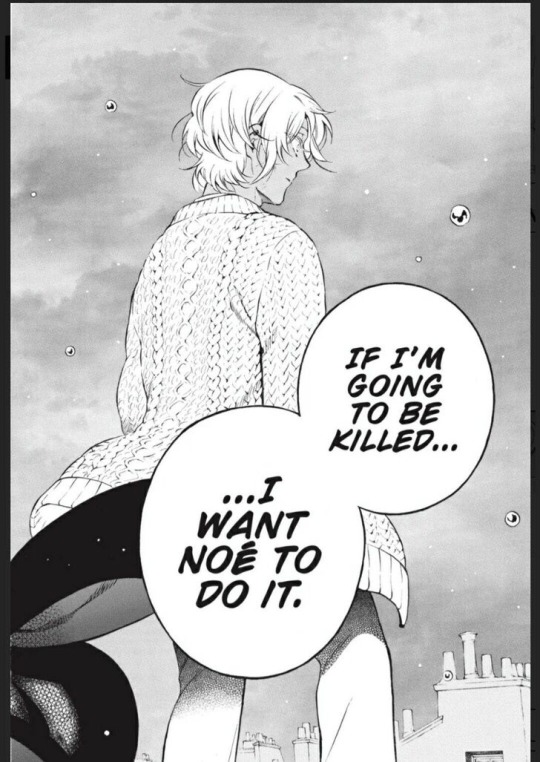
So this line has a double meaning that refers to the characters and the reader. As yeah it is nice to read vnc and enjoy the happy moments without knowing the painful details of what’s to come.
💜: /Over there something is flapping their wings/
💙: /And these uncountable days pass by. It’s not worth worrying about. So many unknown things, without meaning/
💜: /Escalier! I want to see the bright colors beyond!/
Noé, again giving his attention to supposedly insignificant things as Vanitas tends to see the larger picture, not caring for the mundane. Uncountable days can be matched with the grey weather mentioned earlier. But that also means things are murky, blur together, cloudy. They don’t make sense to Vanitas (such as love, his self-worth, the nature within people) while Noé wants to experience all the brightness of the world.
💙: /I told you to be quiet today, yet here we are!/
💜: /Now you loud person!/
💙💜: /I told you I hardly have time to breathe/
So, hypothetical scenario if we take this song literal: Vanoé is exploring the city because Noe wanted to Vanitas couldn’t say no. Vanitas is fed up and Noé thinks his complaints are aggravating. But this part shows a lack of understanding. They’re yelling about their own hardships but don’t see the other’s perspective.
💙💜: /Le formidable! Le formidable! It’s a simple thing. It’s just finding, losing sight and repeating again/
💜: /I want to dream/
💙: /It’s just a dream/
💙💜: /The world keep walking while not knowing the truth at this point/
Ok there’s a lot to dig our teeth in here. First of all, the finding, losing sight, repeating is another way of describing the colliding and rolling down said prior. Vanoe find each other, they lose each other, it’s fated to happen all over again. Now the big piece here, I want to dream/It’s just a dream. Surface-level interpretation > another instance of their differences. Noé wants be surrounded by dreams and wonder. While Vanitas looks at that beauty and scoff at it, since it isn’t real therefore not worth caring for. But if we read into this carefully, Noé wants to dream. He wants to stay in these memories, he doesn’t want to live in a world without Vanitas.
Let’s go back to OP 1: “I love this world and the light only you give me.”
We know OP 1 is Noe’s POV so let’s ask ourselves why would the Noé we are seeing, the one smiling at all the colors of the world say Vanitas is the only light he has (emphasis on “only”). Because the Noé singing the first OP is operating with far more knowledge and despair. We don’t know the truth at this point. “This world” is not real.
Allow me to offer what I think is happening. Noé and Vanitas meet, they go on this journey of understanding, trust, and love, Vanitas reaches his end and is killed by Noé. Noé lives on. We can tell the Noé writing this story is full of regret and sadness. But why is he writing this all down? He’s retelling the memories, putting them down physically on paper. Two things happened:
a) He exchanged his name with Naenia, wishing to remain in a world with Vanitas in it. Because that wish is still very present, Naenia has great interest in Noé. She mentions seeing him before in Louis but it could be a classic mochijun misdirect and it’s actually from receiving his name in a different iteration. There is that official art with Noé wearing Vanitas’ coat with that goat entity he saw in Gevaudan, pinned to his vest.
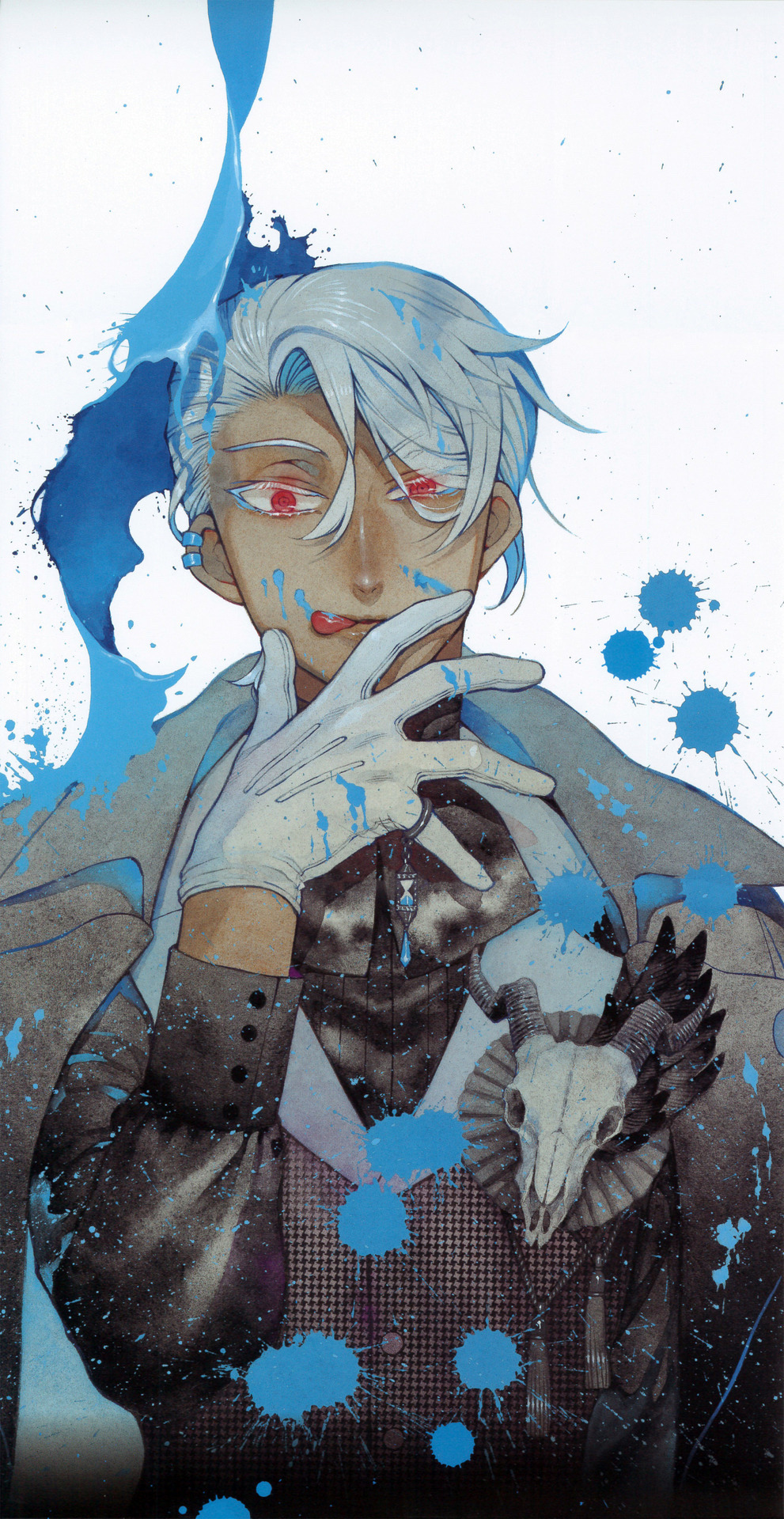
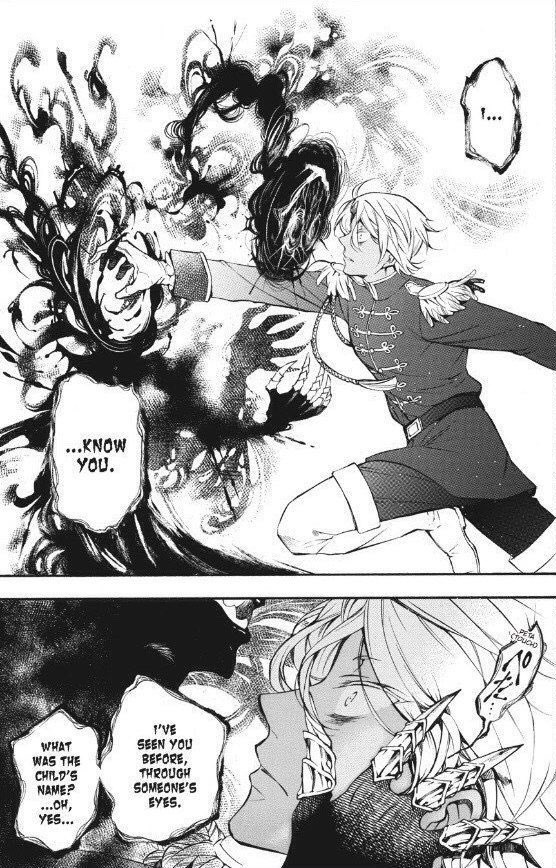
However this can only work if Naenia is still around and isn’t resolved/defeated in the memoirs.
b) This is more likely in my opinion. Noé uses the Books and the memoirs act as a catalyst for him to have the world become his memories or for him to live in them. I know only those with blue blood or something can use the books.
Which is why Dr. Moreau had those experiments with Vanitas and Misha. Don’t worry, I already have a theory that Archivistes are some form of blue moon vampires but that is a whole other discussion. Point is, I think the Books of Vanitas are like an Elliot sword situation. Yes, Elliot owns the Nightray sword and carries it around but you don’t know its true purpose in the story until Leo wields it.
Noé causes these memories to replay, perhaps to save Vanitas or simply to dream again. Go back to when he was last happy. But here’s the thing, the Noé in this memory is unaware or ignorant of this, sees his present world as the real one and undergoes the events of the series. Vanitas dies, he lives on, and creates a memory world for himself. Rinse, recycle, repeat. Essentially, the first ED gave it away. The entirety of VnC is a layer of memories. Even the narrator Noé we are hearing is a memory that is trying to manifest a world of his own.
Reality and dreams are all intertwined now and Noé got lost in it. There are leaks in the cracks, for example when Vanitas cries and tells Luna his mother died at childbirth why would he call to her. Initially, you can read this as he’s just missing what he never had. But what if Vanitas’ mother was present in his life 9 memory loops ago but because these memories get further from the truth the more it happens, Noé simply forgot that detail when making the memoirs at some point in time. So now, in the memory layer #52 Vanitas has no mother.
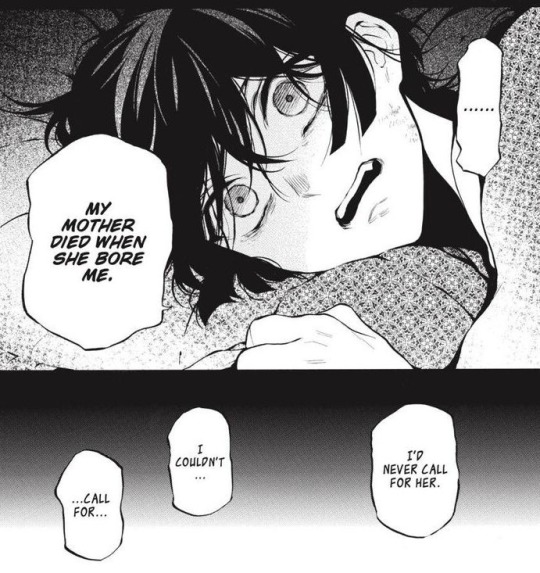
💜: /We will see what we “cannot see”/
💙: /We will know what we “don’t know”/
💙💜: /The final stop of this world that seems to be changing, seems only further ahead/
Noe’s line possibly goes into his Archiviste nature and how he experiences reading memories. It can as well build back into the dream/memory loop thing, he’s seeing things he can no longer “see.”
Vanitas’ line can be drawn to what Noé said during their fight.
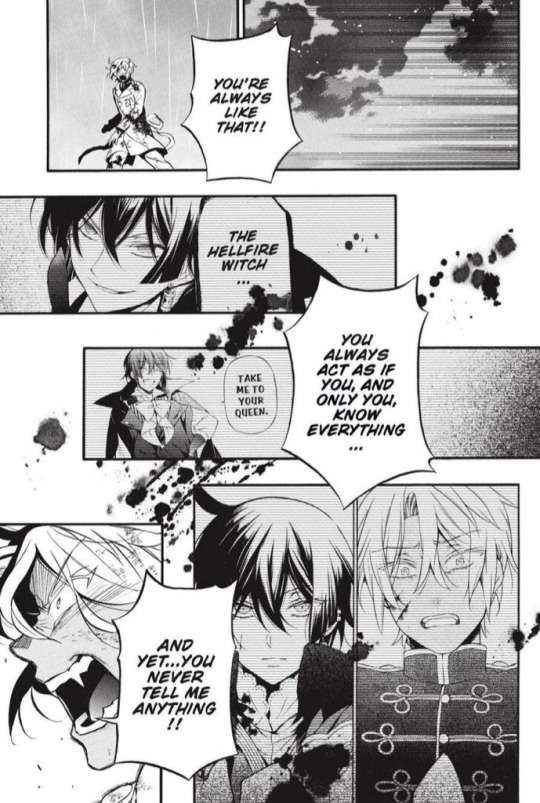
Vanitas acts like he has the final word and has a full grasp of how this world/himself works. But he really doesn’t and Noé is living proof of that, proving him wrong on several occasions that there’s still hope, they can’t give up yet, he won’t leave him etc. The final stop of this world is changing, but it’s further ahead. This is a story, a preserved section of time from the past. We gotta ask ourselves... why would the last stop be changing? Again, Vanitas’ death is the final stop but it’s changing, perhaps from the countless iterations we’ve gone through Noé writes the memoirs in a way that delays the ending. So he could remain just a little longer…
💙💜: /Le formidable! Le formidable! Everything is fine. While forgetting, hiding, and repeating it/
💙: /This worthless/
💜: /wonderful/
💙💜: /world we are walking on/
💙: /I don’t know but even so/
💜: /If it can make you smile.../
After this, it ends the song by repeating the first chorus with the colliding-rolling down part so I’ll make this the cutting point. The “everything is fine” totally doesn’t stick out in a story where we know everything will not be fine. The forgetting and hiding goes back to my dream-memory theory, Noé is hiding from the truth in these stacks upon stacks of memories and is possibly forgetting things as they really happened as a result. We already know he isn’t the most reliable narrator. But Noé wants to see Vanitas’ smile.
If it can make you smile again, if it can replay your laughter, why would I ever leave this wonderful lie? In OP 1: “Your laughing was reflected by a daydream”.
I’ll conclude this by saying two things. If you want to get even deeper, you can interpret Vanitas in this song as the voice in the back of Noé’s head. Its just a dream, this world is actually worthless, and Noé is trying to drown out those thoughts. Because yeah they sing lines together but the only time they’re directly speaking to each other is when Vanitas scolds Noé and Noé shouts back, calling him loud. Finally, I could be wrong in all this. I am aware how crazy I may look and I'm so thankful if you read this far.
But yeah if this is anywhere near canon, mochijun must be the most unhinged, absolutely cracked author I’ve ever seen. We’re going into Pandora Hearts levels of intricacy here. I hope you enjoyed my insanity 👍🏼
#anime#manga#les memoires de vanitas#the case study of vanitas#vanitas no carte#jun mochizuki#vnc manga#vnc#noe archiviste#noé#vanoe#song#lyric breakdown#analysis#theories#memory loop#Vanitas#I’ve lost it fr#I love this so much tho#tumblr#fyp
166 notes
·
View notes
Text
great news, folks, my professor told me I have the power to be a menace to society and then gave me full points for an analysis in which I took a 300 word detour to explain Goncharov. I'm having the time of my fucking life.
#megs vs mlis#in my defense the goncharov analysis was actually the PERFECT case study for what i was analyzing.#god what a time goncharov was. fought in the war on misinformation on the side of the misinformation.#anyway those were not his exact words and it was not related to my goncharov analysis but it was VERY funny okay#dude told me unprompted ten minutes after first face to face meeting that my skillset is capable of shaping the fabric of society. buckwild.#it was actually delightful. wizard hours honestly.#getting a good grade in grad school which is both— wait.
65 notes
·
View notes
Text
1880s: Dominique is very Masculine, and very Eccentric

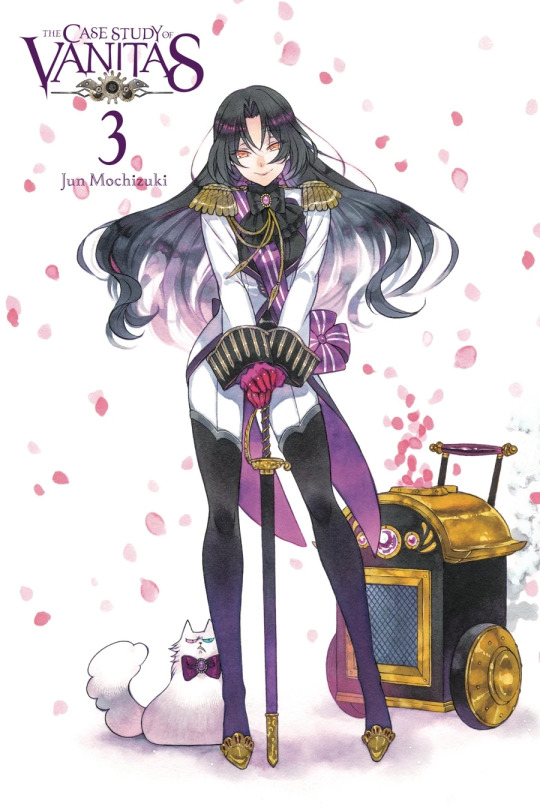
In today's standards, Dominique is a fairly feminine woman. Yes she's wearing a prince inspired outfit, but it's feminized with the tight pants, long stockings, heels, and long hair, but what if I told you that was all considered masculine in the olden days?

The Time Period
Givn the story takes place when the alternate Eiffel Tower (can't remember the name) was being built, we can assume vnc takes place in the late 19th century, otherwise known as the Victorian era, ranging from 1820 to 1914.
The fashion looked somewhat like this, you can see some similarities to the outfits worn by the main cast.

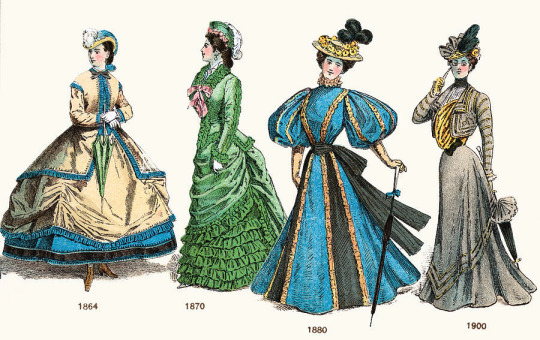
Dominique's outfit doesn't really resemble much of the fashion at the time, you can make som mild comparisons to Victorian royal menswear, but I'd say her fashion is more similar to 17th century royal menswear, specifically,
King Louis XIV
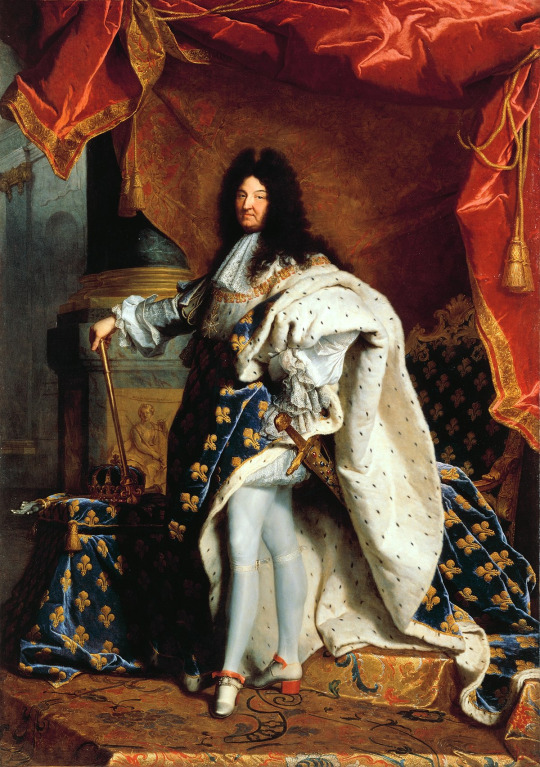
The long hair, the tight white bottoms, the heels, the loose sleeves, the train of fabric behind him, It is said that King Louis was a big womanizer, who does this all sound like? It's almost as if Dominique is trying to be Louis- oh wait.
Also fun fact, King Louis XIV was born in Saint-Germain-en-Laye.


Masculinity & Eccentricity
For us in the present, King Louis XIV looks pretty feminine, and that was probably a shared sentiment in the 19th century, he looked outdated, but that same outfit on a woman like Dominique would cause some controversy if not for her status.
In the 19th and early 20th century, a woman wearing pants was not too accepted, women usually wore dresses, and pants were kept as a sports/work attire. A woman would not just go on about her day wearing a pair of pants, she'd be seen as strange, and maybe even get into trouble. Dominique wearing pants, and very tight pants reminicscent of older eras, is definetly a bold choice.
Her hair is long and straight, which is not how you'd usually describe a victorian woman's hair. It wasn't even that much of a gender thing, but more of a formality thing. Women at the time would have their long hair in an updo. Actually, according to Whizzpast, long loose hair was a thing only models and actresses wore to depict romantisiscm and intimacy.
Dominique's long hair makes a lot of since, she has a bold, eccentric personality, she's not one to conform, she's the current family outcast, but she is also a very romantic person, and is constantly seen in romantic/intimate scenes, so her loose hair really depicts that.
All in all, Dominique's appearance states a bold, romantic blast to the past with a pinch of her desceased brother.
If you want to look into queer subtext, you can assume that''s one of the reasons Noe drinks her blood.
#damn this is the longest analysis/essay I've done in a while#vnc really makes me think#vnc#vanitas no carte#dominique#dominique de sade#french fashion#fashion history#anime#manga#the case study of vanitas
55 notes
·
View notes
Text
Wait...y'all don't supposed that Charles is actually the missing No. 70, do you? He's weirdly ethereal, an enigmatic part of the Church, and has blue eyes (albeit less vibrant, but that wouldn't be out of place since he likely wouldn't have undergone the exact same procedures as Vanitas and Mikhail)... Or perhaps he's another number... But I do think that gap between Vanitas and Mikhail is intentional.
#charles of diamond#vanitas#mikhail#no. 70#vanitas no carte#vnc#the case study of vanitas#theory#analysis#meta
18 notes
·
View notes